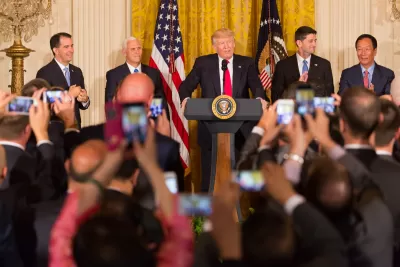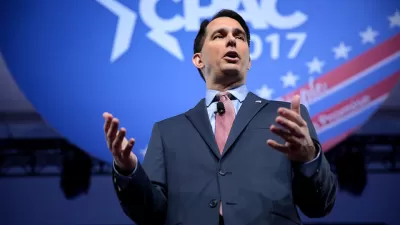The Republican Party once touted a deal to bring Foxconn to Wisconsin as evidence of their commitment to bringing manufacturing jobs back to the U.S., but the deal has soured, potentially beyond rescue.

As part of a development deal brokered by former Wisconsin Gov. Scott Walker and celebrated by President Donald Trump, Wisconsin agreed to pay $3 billion in subsidies to lure Foxconn to build a massive LCD display factory in Racine County.
Now Timothy B. Lee reports the latest developments in an ongoing saga that included numerous controversies and disappointments: "In a Monday letter, the state informed Foxconn that the company wouldn't get the first installment of the $3 billion because Foxconn wasn't holding up its end of the deal."
The state is accusing Foxconn of falling short of several terms in their 2017 agreement. For instance, "Foxconn would be eligible for the first round of subsidies if it hired at least 520 full-time employees to work on the LCD panel factory by the end of 2019. Foxconn claimed that it had cleared this bar by hiring 550 employees in the state. But Wisconsin found that Foxconn had only 281 employees who counted toward the requirement," according to Lee.
Moreover, "Foxconn was supposed to spend $3.3 billion on the project by the end of 2019. Instead, Foxconn had only spent around $300 million by the end of the year."
Foxconn has reneged on other parts of the deal, too, like its commitment to build Generation 10.5. Foxconn is now reportedly planning to build a plant to manufacture LCD panels based on the Generation 6 standard. "That means the factory will be much less expensive to build and require fewer workers when it's complete.
That means the factory will be much less expensive to build and require fewer workers when it's complete.
FULL STORY: Wisconsin blames Foxconn, says $3 billion factory deal is off

Planetizen Federal Action Tracker
A weekly monitor of how Trump’s orders and actions are impacting planners and planning in America.

Chicago’s Ghost Rails
Just beneath the surface of the modern city lie the remnants of its expansive early 20th-century streetcar system.

San Antonio and Austin are Fusing Into one Massive Megaregion
The region spanning the two central Texas cities is growing fast, posing challenges for local infrastructure and water supplies.

Since Zion's Shuttles Went Electric “The Smog is Gone”
Visitors to Zion National Park can enjoy the canyon via the nation’s first fully electric park shuttle system.

Trump Distributing DOT Safety Funds at 1/10 Rate of Biden
Funds for Safe Streets and other transportation safety and equity programs are being held up by administrative reviews and conflicts with the Trump administration’s priorities.

German Cities Subsidize Taxis for Women Amid Wave of Violence
Free or low-cost taxi rides can help women navigate cities more safely, but critics say the programs don't address the root causes of violence against women.
Urban Design for Planners 1: Software Tools
This six-course series explores essential urban design concepts using open source software and equips planners with the tools they need to participate fully in the urban design process.
Planning for Universal Design
Learn the tools for implementing Universal Design in planning regulations.
planning NEXT
Appalachian Highlands Housing Partners
Mpact (founded as Rail~Volution)
City of Camden Redevelopment Agency
City of Astoria
City of Portland
City of Laramie




























